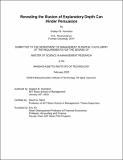Revealing the Illusion of Explanatory Depth Can Hinder Persuasion
Author(s)
Humiston, Graelyn B.
DownloadThesis PDF (1.910Mb)
Advisor
Rand, David G.
Terms of use
Metadata
Show full item recordAbstract
People often believe that they understand complex phenomena much better than they actually do, and this “illusion of explanatory depth” can be undermined by asking them to explain the phenomenon step-by-step. A recent attempt to harness this process as an intervention to reduce political attitude polarization found that participants’ policy positions were less extreme after an attempt to explain the policies in detail; however, this finding has failed to consistently replicate. We hypothesized that revealing the illusion of explanatory depth for a political policy could instead increase openness to persuasion -- that a persuasive argument would have a greater impact on policy support if it was preceded by an attempt to explain the policy in detail. First, we replicated the decrease in participants’ self-rated understanding of a policy after being asked to explain it, with a much larger sample than in prior studies. We then ran an experiment crossing this illusion of explanatory depth treatment with a persuasion treatment, and predicted that the persuasion treatment would have a greater impact for participants who completed the explanation task. However, the results showed the opposite pattern: Participants changed their position less if they were asked to explain the policy beforehand, compared to those in the control condition. Our findings suggest that, counterintuitively, demonstrating a lack of understanding may decrease openness to persuasion, and that we may be wrong about the relationship between persuasion and understanding.
Date issued
2023-02Department
Sloan School of ManagementPublisher
Massachusetts Institute of Technology